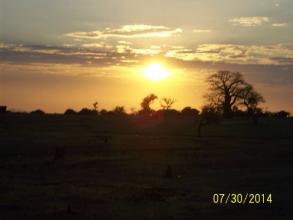Blog Post: Reforesting Malawi: A Mission to Sustainably End Malnutrition

Malawi is a small country in southeast Africa where malnutrition as a result of desertification has left children orphaned by AIDS to fight for their own lives as infections leave them susceptible to disease... the number one killer being Malaria. These kids are stunted and have infected sores on their skin and swollen bellies as worms devour them from within. This sounds like a made up, contrived version of reality written with the purpose of getting readers to feel compelled to action, but it is not so. I have personally held these children in my arms as I stooped by a well to wait my turn to pump water for bathing and laundry. Hardly noticing my arms around them, one little girl stared blankly into the sky and I knew she was one of those "African" kids I had heard about that had no chance to live past her fifth birthday. Holding her, I was forever changed and have since dedicated a lot of time and energy into researching how Americans can sustainably reduce malnutrition in Malawi.
My research lead me to conclude that the very best thing Americans can do for the orphans of Malawi, is to aid in the planting and nurturing of native trees. Moringa, Albida, and Baobab trees may hold the key as they can reverse the effects of desertification by delivering nutrients back into the soil as well as give families an extra income and the benefits of super foods to supplement their traditional diet of nsima (a paste of maize flour and water).
As it turns out, Moringa seeds can purify water and Moringa leaves contain 7x the Vitamin C of oranges, 4x the Vitamin A of carrots, 4x the Calcium of millk, 3x the potassium of bananas and 2x the protein of yogurt. If Moringa were advertised in the United States as the ultimate super food that it is, Americans would snatch it off of shelves and feed the Malawian economy as well as make Moringa a "cash crop" for Malawian farmers that would actually replenish the soil instead of exhaust it as the current cash crops such as tobacco do now.
Albida trees are also essential to haulting malnutrition in Malawi. By keeping their leaves in the dry season to shade crops and dropping them in the rainy season to add Nitrogen (fertilizer) to the soil, Albida trees have been proven to improve maize yields by 280%. This increase in production can give farmers the ability to sell their excess yield for money (in kwacha) that can enable them to but more diverse foods at market.
During my time in Malawi, I came across a few Baobab trees dotting the landscape. These grow to be really tall and hundreds of years old. The fruit can be ground into a dry powder that keeps almost indefinitely and can be made into a juice to drink. The powder offers consumers over 3x the antioxidants of blueberries, over 6x the Vitamin C of oranges, 12x the dietary fiber of apples, 5x the potassium of bananas, more than 2x the calcium of chocolate milk and a whole lot of magnesium.
So that's all fantastic, but how can Americans have a real impact? First, these foods have to be recognized as super foods. Then consumers should start supporting organizations such as Kuli Kuli that sell Moringa products by purchasing their yummy protein bars. Surprisingly, Giant Eagle actually has Baobab products for sale as well! If you are not so into buying these products, the Moringa Meal Project and the African SEED Initiative are great organizations that are making a difference. The Moringa Meal Project plants thousands of Moringa trees and teaches communities how to care for the trees as well as feeds school children healthy school lunches daily. The African SEED Initiative empowers small holders focused on sustainability to achieve success by giving them loans. These could be used to purchase trees for planting.
Malnutrition. It's a big problem with devastating effects, but the solution might just be simpler than we thought. Reforestation of Moringa, Albida and Baobab trees can save the Malawian soil and give farmers the ability to feed their children more than maize. The vitamins in these little known super foods can make all the difference for malnourished children trying to survive. These trees can empower them to begin to thrive.
Category:

































